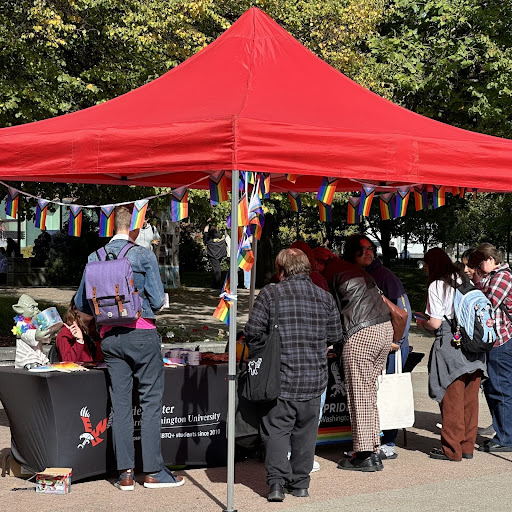Records Reveal Details on Hazing Allegations that Led to Phi Delta Theta Suspension

February 23, 2023
As soon as new members at Phi Delta Theta signed their membership contracts, they were led upstairs to a wall with a tarp over it. None of them knew what was going on.
“Everyone has had to do this, and this will be one of the hardest weeks, but after that it gets better,” a senior member allegedly said. The tarp was removed, revealing a wall of beer. “I want everyone to finish this in under 20 to 30 minutes.”
One member thought it was going to be the worst night of his life.
The students were reportedly told that they didn’t have to finish all of the beer soon after they began drinking, however many still ended up throwing up from their alcohol intake that night.
This incident is only one of many alleged hazing events that occurred at the Eastern Washington University chapter of Phi Delta Theta, according to university investigative records obtained by the Easterner through a public records request.
The university began its hazing investigation last November after a new member of the local fraternity reported hazing to the school and University Police. The investigation concluded in December, and on Jan. 11th, 2023 Phi Delta Theta took responsibility for all allegations against it. This resulted in a loss of recognition by the university until the end of the Spring Quarter, 2023. They were later given a 3-year suspension by the national Phi Delta Theta headquarters.
Hazing is defined by Washington state law as “any activity expected of someone joining a group (or maintaining full status in a group) that causes or is likely to cause a risk of mental, emotional and/or physical harm, regardless of the person’s willingness to participate.” According to a past interview with Stacey Reece, Director of Student Rights and Responsibilities at EWU, an activity may be hazing if it does not represent the values of the group, one does not feel like an equal member of the group, it puts members at risk of any kind of trauma, or one would not feel comfortable having others witness the activity.
“Hazing exists on every college campus, and the hope is that by making more people aware of what hazing entails, we will see more people reporting these issues and less hazing occurring,” said Tricia Hughes, chair of EWU’s hazing prevention committee.
The Phi Delta Theta national headquarters, the local Phi Delta Theta Chapter, EWU’s Interfraternity council, and the Assistant Director of Sorority and Fraternity Life all did not respond to multiple requests for comment by the Easterner. The public records, however, included numerous interviews with the pledges and fraternity members which detailed a number of alleged hazing events.
These hazing events included times in which pledges were pressured into drinking large amounts of alcohol, brought into the woods blindfolded at night and made to locate one another, and punished with wall-sits or push-ups for answering questions incorrectly. Following are specific events, and what happened during them.
Beer Wall
According to public interviews with Phi Delta Theta members, on bid night (where students are offered an invitation to join a fraternity or sorority), new members were presented with what was described as a “wall of beer,” and told that they were to drink all of it within thirty minutes. After a few minutes of drinking, members were told that they didn’t have to drink it all according to the interviews.
“When I finished it, I wasn’t even drunk because I puked most of it up.” one member reportedly said in defense of the night. He, along with many other members, claimed that you could talk to people if you were uncomfortable and that drinking was entirely optional.
“I perceived it as a joke, but others might not have,” another member was quoted saying.
Woods Night
New members were taken out into the woods, made to locate one another by calling out the fraternity motto, then taken back to Cheney all while blindfolded.
Though intended to be a team-building exercise, EWU’s SRR website says that this is a sensory deprivation tactic used in an unfamiliar and unsafe setting.
Wall Nights
New members were lined up facing a wall and made to recite the history of the fraternity, its members and the Greek alphabet. The questions were reportedly yelled, and if members gave three incorrect responses they had to do wall sits or pushups as punishment. Members were required to study six hours a week in preparation for these tests.
“[I think] the wall night could have made others uncomfortable. It makes people feel like shit. They make you do it for about five weeks. If you don’t answer questions correctly, wall sits can last about 5-20 minutes,” one member was recorded saying. Though he said the activity made him uncomfortable, he said that he could “take it” because “it wasn’t that bad.”
There were conflicting reports as to whether or not a senior member of the fraternity punched or slapped the wall next to new members’ heads during this process.
“We test them on their knowledge. We never touch them or make them do anything they don’t want to do. Then we tell them there is a final, but there isn’t one. Then we induct them,” a senior in the fraternity was quoted to have said in defense of the activity.
Big Brother Night
During a wall night, new members were asked to define what a “Big Brother” is (a term used to describe a mentor to a new member) and told that they were incorrect no matter what they answered. The members proceeded to turn around and find out who their Big Brothers were. In celebration, the Big Brothers taped 40oz beers to the new members’ hands and told them to drink.
“Most kids don’t finish it,” one fraternity member was recorded saying. “Some throw up, lots throw up because they are drinking them quickly. Nothing happens if they don’t finish. We are egging each other on, but they don’t get that drunk. It’s just beer.”
“We know that we have made a stupid mistake, and we have been talking about how we are going to change this in the future and build a healthier place for pledges,” The President of Phi Delta Theta was recorded as saying in reference to the hazing allegations as a whole. He said he does not want a bad light to be shown on anybody in the house, as they are tackling a systematic problem rather than an individual one.
The official student conduct code violations Phi Delta Theta was found guilty of were bullying, alcohol and substance violations, hazing, and student and/or group offenses. All members will be required to complete both the “GET INCLUSIVE Alcohol and other Drug” module and the “Alcohol ECheck UP TO Go” program as part of their EWU sanctions, which can be found in greater detail on the SRR website.
As required by Sam’s Law, EWU has had a hazing prevention committee consisting of students, a parent, and staff on campus since Fall 2022. The committee has been working on spreading awareness of the law and creating educational opportunities.
Sam’s Law was created after the untimely death of 19-year-old Washington State University student Sam Martinez in 2019. Martinez was told by a fraternity he was trying to join to drink a half gallon of rum, along with another pledge, in under a half hour. He died of alcohol poisoning later that night as a result of the hazing.
“It will take a whole campus approach to prevent hazing,” said Hughes. “We will need to see buy-in and support at all levels of the university and among staff, students and faculty. This is a cultural shift and needs to be addressed through awareness and prevention programs, policies, processes and training.”






